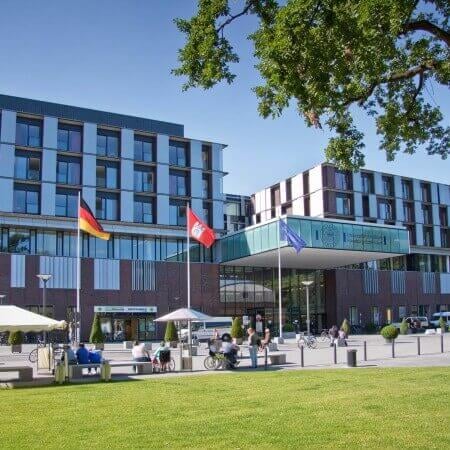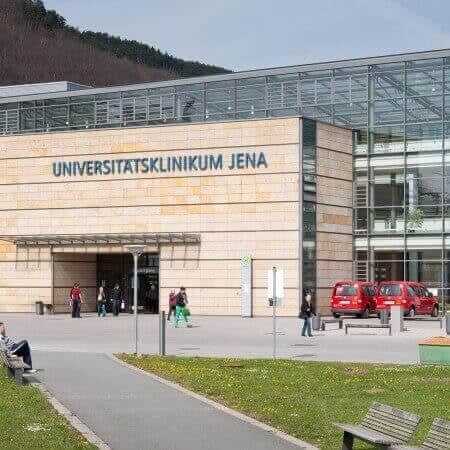Ureteral cancer is a rare urothelial cancer. It accounts for 3% of all tumors of the urinary system. This tumor is usually aggressive, and it is detected at an invasive stage. Most patients require removal of the kidney with the ureter and part of the bladder. Cancer treatment in Germany involves the use of endoscopic and laparoscopic minimally invasive surgical interventions performed with access through the urethra or through short skin incisions.
Content
- Diagnostics
- Treatment principles
- Endoscopic treatment
- Surgical treatment
- Chemotherapy and radiation therapy
- Why is it worth undergoing cancer treatment in Germany
- Treatment in Germany with Booking Health at an affordable price
Diagnostics
Most patients go to the doctor because of the appearance of blood in the urine, less often they are worried about lower back pain. Doctors in Germany use endoscopic examinations and medical imaging techniques to establish the diagnosis. Occasionally, cancer cells can be detected in the urine sediment, but usually they appear late – only after the tumor has invaded the muscle layer.
The main methods for diagnosing ureteral cancer are as follows:
Computed tomography is the main method of medical imaging of the organs of the urinary system. The CT scan helps to detect even small tumors. The sensitivity of the CT scan for detecting neoplasms from 3 to 5 mm is 89%, and tumors larger than 1 cm are found in 100% of cases. Computed tomography data are sufficient to establish the diagnosis and begin treatment. A biopsy is optional.
MRI scanning is used only if there are contraindications to computed tomography. The sensitivity of this method for detecting tumors less than 2 cm is 75%.
Ureteroscopy is an endoscopic diagnostic method involving the introduction of an optical system into the urethra. The doctor examines all organs of the urinary system from the inside and may perform a biopsy.
Biopsy is usually required for tumors up to 1 cm without signs of invasion, since in this case the results of histological examination affect the choice of treatment tactics. For low-grade tumors, the doctor can perform endoscopic organ-preserving surgery, and for high-grade tumors, the kidney and ureter are removed.
Treatment principles
The main method of treatment is surgery. Most patients receive no other treatment.
Several surgical options have been developed to treat ureteral cancer, but in most patients, doctors perform two types of surgical procedures:
- Endoscopic tumor removal with retrograde access through the urinary tract (without skin incisions).
- Nephrureterectomy is a surgical procedure to remove kidney, ureter, and part of the bladder in the area of the orifice.
The second surgery is performed more often. Endoscopic interventions are only possible at an early stage of cancer or in patients with contraindications for nephrureterectomy. In the final stage of cancer, surgery is not usually used, but chemotherapy and palliative procedures are resorted to.
Ureteral cancer is more often detected in the invasive stage. Therefore, most patients require lymph node removal to reduce the risk of recurrence.
After tumor removal surgery, patients can receive intravesical therapy, as well as the administration of immune and chemotherapy drugs into the ureter through a stent. This reduces the risk of recurrence, although the impact on long-term patient survival has not been definitively determined.
Chemotherapy is used primarily with the presence of metastases. It is used at the advanced stage of cancer, as well as in cases when metastatic foci are found in the removed lymph nodes after surgery.
Endoscopic treatment
Minimally invasive endoscopic interventions involve the removal of only the ureteral tumor. The organ itself is preserved.
The doctor uses a ureteropyeloscope, which is inserted retrogradely through the urethra into the bladder and then into the ureter. The specialist carefully examines these organs, assesses the condition of the wall, and takes biopsy from all suspicious areas using the forceps. The tumor itself is removed with the use of electrosurgical or laser methods.
These surgical procedures can be performed in the following cases:
- Low-grade tumor.
- The size of the tumor is less than 1 cm.
- No signs of invasion (invasion into the muscle layer of the ureter).
Endoscopic treatment is minimally traumatic and does not require long-term recovery. It provides the same results in terms of patient survival as kidney removal surgery, but with a slightly higher risk of tumor recurrence. Its repeated development usually occurs in the bladder.
Since relapses occur more often, their timely treatment is required. Early detection of pathology is necessary for timely treatment. Therefore, patients after endoscopic treatment are under more strict supervision. They undergo endoscopic examinations (cystoscopy, ureteroscopy) and computed tomography of the urinary system in 3, 6 months after the operation, and then annually.
In addition to patients with early stage of cancer, endoscopic treatment can also be received by patients with contraindications for kidney surgical resection:
- If they have only one kidney with preserved function left.
- If there are concomitant diseases that make the surgical intervention risky.
After surgery, it is desirable to use additional therapy aimed at preventing cancer recurrence in such patients. To avoid repeated development of the tumor in the bladder, doctors carry out chemotherapy drug instillations and the BCG vaccine, which stimulates the immune system. It is also possible to administer these medications into the ureter through the ureteral stent.
Surgical treatment
Although the option of curing the disease with an endoscopic method, without traumatic surgery, seems attractive to most patients, radical nephrureterectomy remains the main surgical treatment. This is an operation to remove the kidney, ureter, and part of the bladder together with the orifice, which is the place where the ureter flows into.
It is nephrureterectomy that is most often used for ureteral cancer treatment, since in 60% of cases this disease is found in the invasive stage. In addition, non-invasive tumors are more likely to have a high than a low grade, and they are not subject to endoscopic treatment.
Nephrureterectomy has been used in medicine for over 100 years. Since 1952, the technique of surgery with the removal of the bladder in the area of the orifice has been used. In 1995, the endoscopic technique of ureteral extraction was introduced. Today, the entire surgical intervention to remove the kidney with the ureter and part of the bladder can be performed through laparoscopic access.
Laparoscopy is a less traumatic surgery option used for cancer treatment in Germany. Doctors make small incisions in the patient's body, but the surgeon's hands do not sink into the wound. Several ports are introduced through the incisions. The surgery is performed with thin long instruments under the control of a video camera with lighting.
When performing the surgical intervention, German surgeons avoid contact of instruments with the tumor, do not violate the integrity of the urinary tract, perform en bloc removal of all organs and remove them in a special container. With this approach, the risk of recurrence is minimized, since there is no dispersion of cancer cells in the wound.
For patients with invasive cancer, an additional stage of the operation is preferable – lymphadenectomy. Doctors remove the lymph nodes to reduce the risk of recurrence. Lymph node removal has a survival advantage over adjuvant (postoperative) chemotherapy.
Although doctors prefer to perform laparoscopic surgery for cancer treatment in Germany, this method may not always be used. Patients with large, multiple tumors or metastases require conventional surgery through a large incision.
Surgery to remove the kidney with the ureter as the radical intervention (aimed at curing cancer) is performed only in patients who do not have distant metastases. If the patient has them, then surgical treatment is usually not performed. If doctors perform the surgical intervention, then it is exclusively for palliative purposes in order to prevent life-threatening complications and improve the patient's quality of life.
Chemotherapy and radiation therapy
In standard cases, chemotherapy for the treatment of ureteral cancer can be used in the following situations:
- After surgery – if metastases are found in the removed lymph nodes.
- In the case of distant metastases – as the main method of treatment.
Most patients do not receive chemotherapy before and after surgery. Although some studies show a reduced risk of recurrence, this treatment regimen does not significantly affect survival. Currently, the role of chemotherapy in the treatment of ureteral cancer without metastases is considered uncertain.
Radiation therapy for ureteral cancer is used only in the advanced stage, with a palliative purpose. Doctors can irradiate both the primary tumor, if it cannot be removed by surgery, and metastatic lesions. After radiation therapy, life expectancy may increase, but such a goal is not set: the radiation is aimed primarily at preventing or eliminating severe complications, relieving symptoms and improving the patient's quality of life.
Why is it worth undergoing cancer treatment in Germany
Oncological diseases are more successfully treated in countries with advanced medicine, including Germany. There are several reasons for you to use the services of German urologists and oncologists:
- At the early stage, organ-preserving surgeries are used to remove the tumor of the ureter, which allows doctors to fully preserve the anatomy and function of the urinary system.
- Cutting-edge ureteropyeloscopes can remove tumors even in the upper part of the ureter without skin incisions – with a retrograde approach through the urinary tract.
- With the appropriate size of the tumor, surgery to remove the kidney with the ureter is performed laparoscopically. These surgical procedures are less traumatic and reduce the risk of complications.
- Some hospitals use robot-assisted surgery.
- Even at the advanced stage, high-quality cancer treatment in Germany helps to significantly prolong the patient's life: doctors use the very latest chemotherapy regimens, radiation therapy, immunotherapy, and perform palliative surgery.
Treatment in Germany with Booking Health at an affordable price
To undergo ureteral cancer treatment in one of the German hospitals, you can use the services of the Booking Health company. On our website, you can find out the cost of treatment and compare prices in different hospitals in order to book a medical care program at a favorable price. Treatment in German hospitals will be easier and faster for you, and the cost of treatment will be lower.
You are welcome to leave your request on the Booking Health website. Our specialist will contact you and provide a consultation on treatment in Germany. Booking Health will fully organize your trip to this country. We will provide the following benefits for you:
- We will select the best German hospital, whose doctors specialize in ureteral cancer treatment.
- We will solve the problem of the language barrier, and we will provide communication with the doctor of the German hospital.
- We will reduce the waiting time for the medical care program. You will undergo treatment on the most suitable dates.
- We will reduce the price. The cost of treatment in Germany will be lower due to the lack of overpricing and additional coefficients for foreign patients.
- We will take care of all organizational issues: we will prepare documents, meet you in Germany and take you to the hospital, book a hotel, and provide interpreting services.
- We will prepare a program and translate medical documents. You do not have to repeat the previously performed diagnostic procedures.
- We will help you keep in touch with doctors after the completion of treatment in Germany.
- We will organize additional medical examinations and treatment in the German hospital.
- We will buy medicines in Germany and forward them to your native country.
Your health will be in the safe hands of the world's leading doctors. The Booking Health specialists will help reduce the cost of treatment, organize your trip to the German hospital, and you can fully focus on restoring your health.
Authors:
The article was edited by medical experts, board certified doctors Dr. Nadezhda Ivanisova and Dr. Sergey Pashchenko. For the treatment of the conditions referred to in the article, you must consult a doctor; the information in the article is not intended for self-medication!
Our editorial policy, which details our commitment to accuracy and transparency, is available here. Click this link to review our policies.
Sources:
American Oncology Institute




















